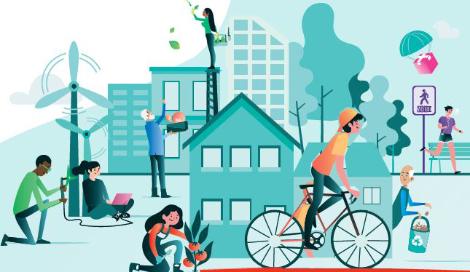Tomorrow my territory 09 Valuing bio-waste in my territory
Recycling of bio-waste
November 2019
Agence pour l’Environnement et la Maîtrise de l’Energie (ADEME)
The 20 factsheets in the collection « demain MON TERRITOIRE » have been designed to give candidates and elected officials practical keys to take action, to open up the field of possibilities based on the experiences of other elected officials, from small towns to conurbations, large urban areas or sparsely populated areas. In the four corners of France, both in metropolitan France and in the French Overseas Territories, many of them are taking action, together with the players in their territories, to prepare for the future by taking action to mitigate climate change and adapt to its effects. With its knowledge and presence throughout the country, ADEME supports them with its tools, activities and financial aid.

Why is it important to implement special treatment of bio-waste?
Food waste, green waste from parks and gardens and other biodegradable waste are still today massively dumped in landfills, generating greenhouse gases, or incinerated even though they represent an important material resource. In order to make better use of this potential, European regulations stipulate that by 2023, every citizen must have a solution for sorting their food and garden waste separately, this sorting making it possible to better collect them for recovery. This obligation is already underway for large private or public producers. These materials can be used to produce energy through methanisation, and/or be reintroduced into the plant cycle by composting or spreading. A solution to fight against soil impoverishment with an input of compost partly replacing chemical fertilizers.
How do you do it?
-
The first action is prevention. We act « at source » by taking initiatives to combat food waste in the area’s collective catering, from schools to retirement homes and municipal canteens.
-
Local solutions are put in place to facilitate the sorting and collection of this bio-waste: domestic composting can be developed for households with space; shared composters can be set up at the bottom of buildings or in a neighbourhood; additional collection for this organic waste can be set up, separated from other household waste.
-
Elected officials, collection agents, households, building managers, market vendors, restaurants and food shops are being sensitized… If those concerned are not informed and sensitized, sorting will not be carried out correctly, if at all. This communication needs to continue beyond the launch phase to anchor habits.
-
Human resources are provided to ensure that shared composting sites are well managed, without inconvenience, which is a guarantee of sustainability. The site referents are met regularly to maintain mobilization. Community agents, trained in community management, become composting « masters ».
-
Plant shredders are made available to private individuals, which contributes to quality compost. The use of these tools can be shared. In addition, this contributes to the fight against the burning of green waste, a forbidden and very polluting practice.
-
Upstream, we are planning the recovery of organic waste: use of compost for the territory’s green spaces, distribution to residents for gardening or partnership with farmers for use on their crops. So many savings in chemical fertilizers for the area and for the environment! If the bio-waste deposit in my area allows it, we can also study the opportunity to install a methanisation unit to recover the biogas and use it as a source of energy to power the area’s vehicles or for heat and electricity needs.